- Home
- Sara Shepard
Everything We Ever Wanted Page 4
Everything We Ever Wanted Read online
Page 4
Page 4
“See anything interesting?”
Joanna jumped. Scott stood at the bottom of the stairs, his hands hidden in his sweatshirt pouch. His eyes glowed, as if she’d turned a flashlight on some wild animal in the woods.
Joanna pressed her hand to her breastbone. She could feel her heart through her thin sweater. “H-How did you get here?”
Scott gestured with his thumb toward the front door. The easiest way to get to the main house from his quarters was to exit through the door of his suite, walk all of four steps, and enter the house through the mud room, which led to the kitchen. Instead, Scott had walked the whole way around the outside of the house to this door, the front door. He had to know that Joanna and Sylvie and Charles were convened in the kitchen. The smell of banana bread was overpowering, penetrating the thick walls.
So he’d avoided them. Of course he didn’t want to see them. Was it because he didn’t want to answer their questions about the incident? Although that was laughable; they wouldn’t ask him questions. No one ever asked Scott questions. Sylvie would flutter about, shove a piece of bread at Scott, and hover over him obsequiously until he ate it. Joanna would make small talk, busying her hands with the bread knife or the catalogs. And Charles would sit silent, seething. Scott wouldn’t have to face anything. Everyone always tiptoed around him, even when he hadn’t done anything wrong.
Scott raised his chin, gazing at her unflinchingly. Perhaps he knew what was going through her mind, what she was trying to figure out. She dared to peek back. He looked the same as he always did—disheveled and self-assured, lazily handsome. He obviously looked nothing like the other Bates-McAllisters, with their wide eyes and thin lips and ears that stuck out slightly. While Charles and Sylvie’s skin were pale, Scott’s was more of an olive tone, easily tanned and never blotchy. His facial features a curious, intriguing mix of cultures. It was one of the many things the family never talked about—that Scott wasn’t white. It both was and wasn’t an issue for them. They acted as though it didn’t matter, yet Joanna wondered if, subconsciously, it affected their every reaction.
Scott didn’t seem any different in the wake of the boy’s death. Certainly not weighted down or guilty about anything. If he was hiding something, the shame would be written all over his face, wouldn’t it?
Joanna lowered her eyes, realizing she’d been staring at him too long. “I should …” she said, ducking her head and teetering, idiotically, toward the kitchen.
“Leaving because of me?” he teased. When he smiled, he showed off long, wolflike teeth.
“Um, no. No!” Joanna sputtered. Her face felt hot. She scrambled for a pressing reason to be back in the kitchen but came up with nothing.
Scott stepped forward until he was just inches from her. He remained there, appraising Joanna, making up his mind about something. He was close enough that Joanna could smell cigarettes and soap on him, so close he might kiss her. She could see the V-shaped fibers in his sweatshirt and that the drawstring for his hood was tipped with silvery metal. He breathed in and out. She barely breathed at all. She felt so small and vulnerable next to him. Hummingbird-frail.
“Boo,” Scott whispered.
“Ha!” Joanna exclaimed, like she thought it was a joke, jumping a little.
Scott quickly receded. In seconds, he was at the front door. Once his back was to her, he held a dismissive hand over his head. “Later. ”
The door banged shut. Joanna listened to his footsteps walking down the flagstone path. A car door slammed, the tires screeched. The heat kicked on, and an unsavory mix of dust, clove cigarettes, and varnish wafted through the vents. She remained in the hallway for a moment, raking her fingernails up and down her bare arms. There was a wet prickle of sweat on the back of her neck. Her skin felt flushed.
Boo.
When Joanna returned to the kitchen, she expected Charles and Sylvie to look up, instantly aware that something about her was askew. But their heads were pressed together close, whispering.
“But, Mom,” Charles was saying. “The call. Don’t you think—”
“There’s nothing to talk about,” Sylvie interrupted.
Joanna took a step back and slid behind the wall. They hadn’t seen her.
“Still. You should call a lawyer. Just in case. ” Charles hissed.
Joanna widened her eyes. So he did think a lawyer idea was a good idea.
There was the sound of rustling papers. “What would be the point of that?” Sylvie asked.
“Protection, obviously. It could mitigate things. ”
Sylvie murmured something Joanna couldn’t hear. Then Charles sighed. “But what about what happened at the graduation party?” he whispered. “Remember? The fight in front of Bronwyn? Do you think that could be a link to this thing with Scott and the boys?”
“No,” his mother interrupted fast. “There’s no link between this and that. ”
“How can you be so sure?” he pressed. Sylvie didn’t answer.
Joanna couldn’t stand it anymore. She tiptoed back to the bathroom, flushed the toilet, opened the sink taps the whole way so that Charles and Sylvie would hear them gushing. She stared at herself in the mirror. Her mouth was a small, crinkled O. Her skin was pallid, almost yellowish.
What had happened at the graduation party? Did Scott attack Charles? He’d never told her that.
She shut off the taps. And then she clomped across the living room, shaking the tension out of her hands. She even feigned a cough, as if all those other sounds weren’t enough. Sylvie and Charles were already snapped back to their cheerful selves by the time she walked through the doorway. They were waiting for her, smiling welcomingly.
“Everything all right?” Sylvie asked.
“Of course. ” Joanna sat down, pulled an L. L. Bean catalog toward her, and whipped through the pages. Travel alarm clocks! Monogrammed tote bags! Pictures of vacationing families, all of them guileless and trouble-free!
So Charles and his mother were worried about Scott, but they were leaving Joanna out of it. Maybe because she wasn’t family, maybe because she wouldn’t understand, or maybe because she wasn’t important enough to know. There were so many possibilities. Joanna tried to conceal the mix of hurt and disappointment she felt as best she could, leaning over the pages, chuckling when they got to the travel section for pets. The manufacturer made a dog travel bed that could fold up to the size of a hackey sack. Imagine that.
Chapter 2
Fischer Custom Editorial had been planned out carefully by designers and architects, perhaps even sociologists and psychiatrists. Individual workstations were private and quiet, whereas the meeting rooms were bright, vivid, and provocative, overlooking Philadelphia’s City Hall. All the bathrooms were equidistant from where everyone sat. Even the items in the vending machines had probably been chosen after months of careful research—enough lowcalorie treats for dieters, enough Snickers and Milky Ways for bingers. Things with nuts and things without nuts. An assortment of teas and gourmet coffees. There was always wine and beer in the full-size fridge, and they had parties at 4 p. m. every Friday to boost morale.
Charles Bates-McAllister sat in his boss’s office with a few others, staring at a pamphlet which lay on the glass table. The photo on the front was of a couple standing in a field, the man with a long beard and wild hair, the fresh-faced woman in a long dress and an apron. It reminded Charles of the famous American Gothic painting, except that the man had an earring and a tattoo on his neck that peeked out from under his plaid shirt, and the woman looked way too refreshed and delighted to have spent all her life working the fields. “Back to the Land,” said the caption, in large yellow block letters.
“So this is the idea,” his boss, Jake, said. “For one year, people give up their lives. They quit their jobs, they leave their homes—maybe they sell their homes—they come to central Pennsylvania and build a house from scratch, out of logs, moss, and whatever else. While they’re bui
lding their house, they have to live in a tent. Even if it’s winter. They build their own furniture and grow their own food. If they eat meat they shoot and prepare it. They’re mostly given some livestock and sheep, and they make their own clothes. They can choose to be in a community and have a specialized job, or they can live in the wilderness. Of course, the wilderness isn’t really that far from civilization. A hospital is only twenty minutes away. If they need a telephone, they can find one. ”
The whole table stared at him. “And people do this?” Jessica, the photo editor, finally asked.
“A lot of people,” Jake answered. “You wouldn’t believe how many people. ”
“It sounds like a cult,” Steven from the art department murmured.
Jake shrugged. “Some people see it as a vacation, I guess. I know, I don’t get it, either. ”
“And you have to pay for this?” Steven asked.
Jake nodded. “You pay for the land you live on. I think it’s thirty thousand dollars a year. And they provide training so that you won’t die out there. ”
“Thirty thousand dollars?” Jessica whispered.
“And some people stay for more than a year,” Jake said. “They see it as an escape. Freedom. ”
Everyone was silent. “Maybe in this day and age, with the economy tanking, terrorists blowing up hotels, and the housing market crashing, this is what people want,” Becky, a fellow editor, suggested.
Charles looked at the photo again. The couple did look happy. But he figured it was a kooky kind of happiness reserved for the same kinds of people who meditated and spoke to plants.
“They want us to do a magazine feature about their community,” Jake explained, “to drum up business. I know it’s a little unusual and not the normal kind of account we typically accept, but we’re hurting for money. And maybe this will be an opportunity for all of you to stretch your skills a little. ”
Charles shifted. Stretching their skills was a euphemism for putting aside all judgments about this kind of endeavor and making the best possible product he could. Then again, it wasn’t that different from the slightly contradictory messages he was encouraged to ignore about Fischer’s other clients. Like the car manufacturer that asked him to write an article about their brand-new SUV and just “tone down” the fact that the car got terrible highway and city gas mileage. Or the credit card company that suggested Charles write a story encouraging shoestring-budget families to charge thousands of dollars more on their Visa, so that they would accrue enough rewards points to buy a handheld shoulder massager or an iPod docking system.
Perhaps Jake had selected Charles and the rest of his colleagues for this particular project because they were all the least likely to say no. Steven was unabashedly Christian; spiritual songs were always floating out from his office, and at last year’s Christmas party, he’d earnestly asked one of the junior designers to check out his church. He never refused anything that was given to him, as if it wouldnm, acet be Jesuslike to do so. Jessica was at risk for being fired—she had been egregiously late with shots for another magazine, and another photo editor had to step in and bail her out. Becky always did whatever anyone asked of her, without complaint. Charles was somewhat the same—he never voiced a moral obligation to anything they wrote about or stood behind. Whenever he felt tempted to whine, he saw himself at eight years old, running frantically behind his brother into the ocean. When a wave took him down and tossed him back to shore, his father stood over him on the beach. What’s the matter with you? You’re alive. You’re fine. Your brother can do it, and he’s two years younger. Stop crying.

 Heartless
Heartless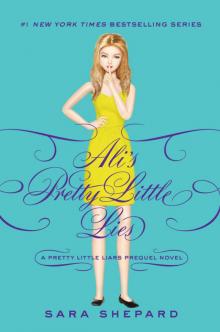 Alis Pretty Little Lies
Alis Pretty Little Lies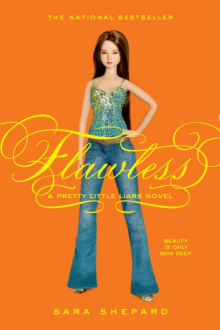 Flawless
Flawless The Elizas
The Elizas Stunning
Stunning Pretty Little Secrets
Pretty Little Secrets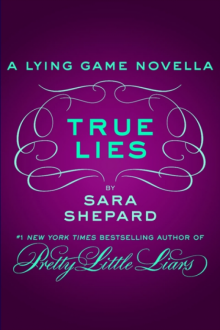 True Lies
True Lies The Good Girls
The Good Girls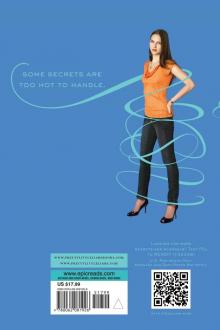 Burned
Burned Perfect
Perfect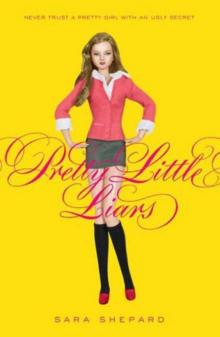 Pretty Little Liars
Pretty Little Liars Unbelievable
Unbelievable Deadly
Deadly Vicious
Vicious Crushed
Crushed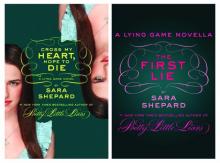 The First Lie
The First Lie Cross My Heart, Hope To Die
Cross My Heart, Hope To Die The Lying Game
The Lying Game Wicked
Wicked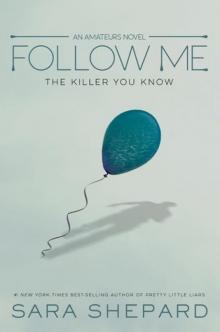 Follow Me
Follow Me Seven Minutes in Heaven
Seven Minutes in Heaven The Perfectionists
The Perfectionists Killer
Killer Twisted
Twisted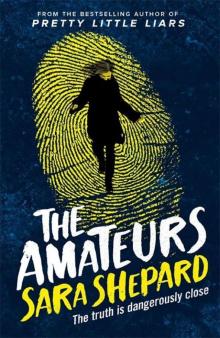 The Amateurs
The Amateurs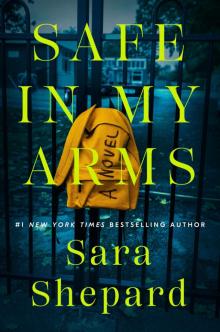 Safe in My Arms
Safe in My Arms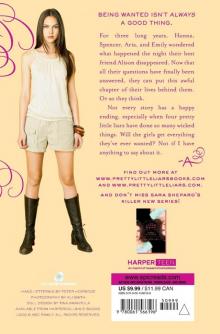 Wanted
Wanted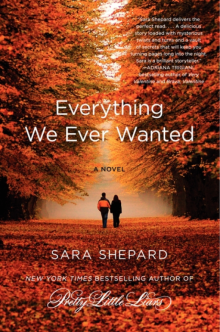 Everything We Ever Wanted
Everything We Ever Wanted Two Truths and a Lie
Two Truths and a Lie The Visibles
The Visibles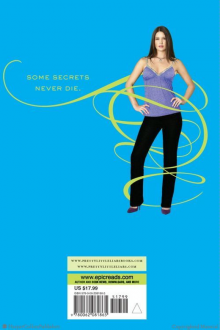 Ruthless
Ruthless Hide and Seek
Hide and Seek The Heiresses
The Heiresses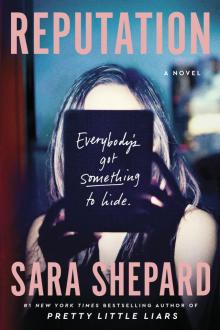 Reputation
Reputation Never Have I Ever
Never Have I Ever Toxic
Toxic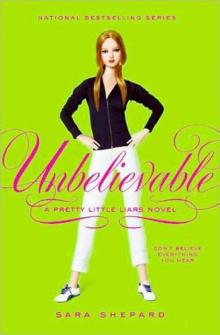 Unbelievable pll-4
Unbelievable pll-4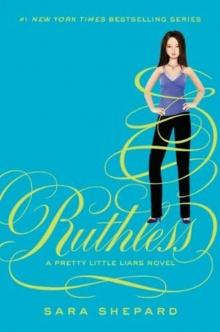 Ruthless pll-10
Ruthless pll-10 Seven Minutes in Heaven tlg-6
Seven Minutes in Heaven tlg-6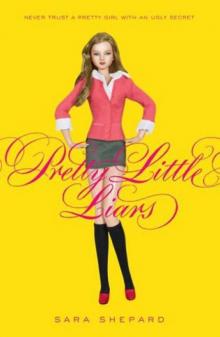 Pretty Little Liars pll-1
Pretty Little Liars pll-1 Pretty Little Liars #11: Stunning
Pretty Little Liars #11: Stunning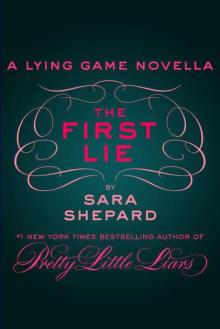 4.5 The First Lie (the lying game)
4.5 The First Lie (the lying game) The Amateurs, Book 3
The Amateurs, Book 3 Wanted pll-8
Wanted pll-8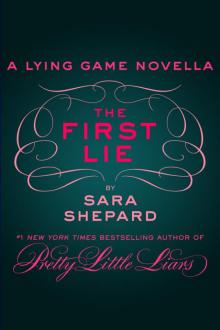 Lying Game 00: The First Lie
Lying Game 00: The First Lie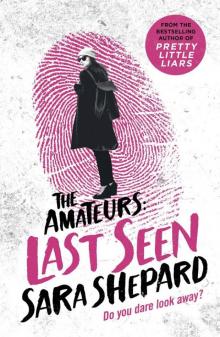 The Amateurs: Last Seen
The Amateurs: Last Seen The Lying Game #6: Seven Minutes in Heaven
The Lying Game #6: Seven Minutes in Heaven Pretty Little Liars #14
Pretty Little Liars #14 All the Things We Didn't Say
All the Things We Didn't Say Stunning pll-11
Stunning pll-11 Heartless pll-7
Heartless pll-7 The Lying Game tlg-1
The Lying Game tlg-1 The Elizas_A Novel
The Elizas_A Novel Perfect pll-3
Perfect pll-3 Burned pll-12
Burned pll-12 Twisted pll-9
Twisted pll-9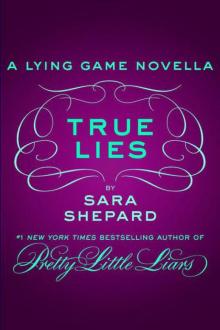 True Lies: A Lying Game Novella
True Lies: A Lying Game Novella Pretty Little Liars #9: Twisted
Pretty Little Liars #9: Twisted Two Truths and a Lie tlg-3
Two Truths and a Lie tlg-3 Crushed pll-13
Crushed pll-13 Pretty Little Liars #15: Toxic
Pretty Little Liars #15: Toxic Pretty Little Liars #12: Burned
Pretty Little Liars #12: Burned Killer pll-6
Killer pll-6 Pretty Little Liars 14: Deadly
Pretty Little Liars 14: Deadly